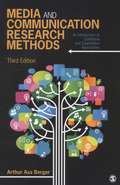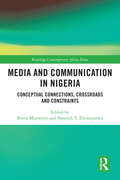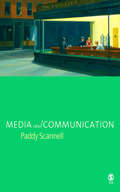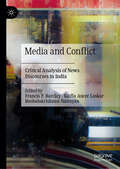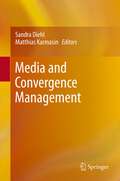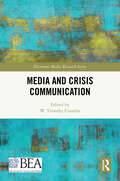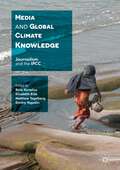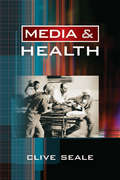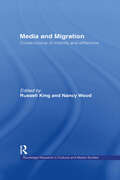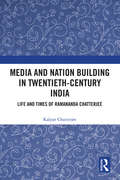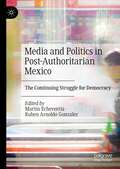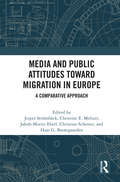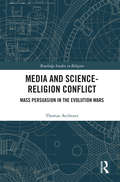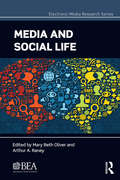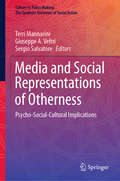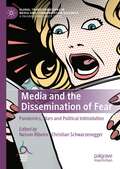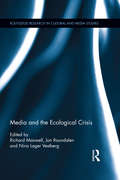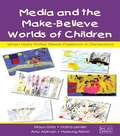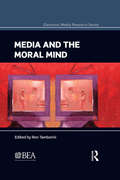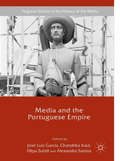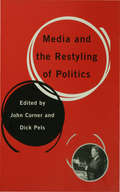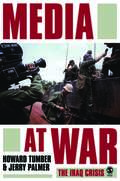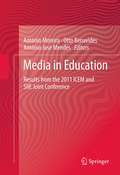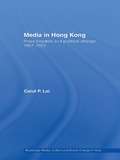- Table View
- List View
Media and Communication Research Methods: An Introduction to Qualitative and Quantitative Approaches 3rd edition
by Arthur Asa BergerThe new edition combines insightful discussions of qualitative and quantitative media and communication research methods as it covers each topic thoroughly in a fun-to-read style. Ideal for beginning research students at both the graduate and undergraduate level, this proven book is clear, concise, and accompanied by just the right number of detailed examples, useful applications, and valuable exercises that are sure to get your students to want to understand, and master, media and communication research.
Media and Communication in Nigeria: Conceptual Connections, Crossroads and Constraints (Routledge Contemporary Africa)
by Bruce Mutsvairo and Nnamdi T. EkeanyanwuCommunication is changing rapidly around the world, particularly in Africa, where citizens are embracing digital technologies not only to improve not only interpersonal communication but also the state of their financial well-being. This book investigates these transformations in Nigeria’s booming communication industry. The book traces communications in Nigeria back to pre-colonial indigenous communications, through the development of telecommunication, broadcasting networks, the press, the Nigerian film industry (‘Nollywood’) and on to the digital era. At a time when Western voices still dominate the academic literature on communication in Africa, this book is noteworthy in drawing almost exclusively on the expertise of Nigerian-based authors, critiquing the discipline from their own lens and providing an important contribution to the decolonisation of communication studies. The authors provide a holistic analysis of the sector, encompassing print journalism, broadcast journalism, public relations, advertising, film, development communication, organisational communication and strategic communication. Analysis of the role of digital technologies is woven throughout the book, concluding with a final section theorising the future of communication studies in Nigeria in the light of the digital media revolution. Robust in its theoretical and methodological underpinnings, this book will be an important reference for researchers of media and communication studies, and those working on Africa specifically.
Media and Communication: A Critical Reader (Communication Ser.)
by Paddy Scannell"An excellent book providing students with a historical understanding of mass media and communication. Theories, concepts and models are intertwined throughout the chapters challenging students to critically understand and evaluate the role of mass media in society." - Stephanie Goodwin, University of Central Lancashire "In a field whose boundaries are porous and where there is no consensus as to the core concepts, theories and thinkers, Scannell brings certainty to his effort to identify key moments in the history of the study of the media and communication... Essential reading for anyone interested in the historical development of the study of the media in the US and the UK." - Times Higher Education "His account of these major writers and movements is both comprehensive and clearly written, and will be appreciated by students and academics alike... It is the detail of the historical contexts that makes his writing a refreshing look at the history of media and communication in the twentieth century." - Media International Australia Magisterial in scope, Media and Communication traces the historical development of media and communication studies. Media Studies itself has a short history but many antecedents, and in this comprehensive and compelling book, Paddy Scannell sets out to describe and analysize its formulation in North America and Europe. Media and Communication: Offers an accessible and comprehensive analysis of the development of media and communication theory. Includes a summary outline of all the key thinkers. Looks at the study of communication across a range of disciplines - history, literature, sociology, philosophy and linguistics. Challenges readers to engage with the central importance of communication. It will be an invaluable resource for upper level undergraduate and postgraduate students of media and communication, cultural studies and sociology.
Media and Conflict: Critical Analysis of News Discourses in India
by Francis P. Barclay Kaifia Ancer Laskar Boobalakrishnan NatrayanThis book integrates critical studies of conflict news discourses and social media exchanges in India to discuss their underlying sociopolitical and economic ideologies and powerplays. Using several theoretical frameworks to investigate how assorted Indian conflicts are presented in the mediascape, the book aims to educate and empower audiences—and inspire the next generation of journalists to be constructively critical, ethical and peace-conscious.
Media and Convergence Management
by Sandra Diehl Matthias KarmasinConvergence has gained an enormous amount of attention in media studies within the last several years. It is used to describe the merging of formerly distinct functions, markets and fields of application, which has changed the way companies operate and consumers perceive and process media content. These transformations have not only led business practices to change and required companies to adapt to new conditions, they also continue to have a lasting impact on research in this area. This book's main purpose is to shed some light on crucial phenomena of media and convergence management, while also addressing more specific issues brought about by innovations related to media, technologies, industries, business models, consumer behavior and content management. This book gathers insights from renowned academic researchers and pursues a highly interdisciplinary approach. It will serve as a valuable reference guide for students, practitioners and researchers interested in media convergence processes.
Media and Crisis Communication (Electronic Media Research Series)
by W. Timothy CoombsThis volume centers on the relationship between media and crisis communication, the need to address which has only been heightened by the recent experience of COVID-19 and the needs for public health crisis communication.With multiple voices and multiple fields engaging simultaneously with crisis communication, this book illuminates the role of media in crisis communication within this complex environment. Both traditional and digital media, including social media platforms, respond to an array of crisis contexts including political crises, public health crises, disasters, and organizational crises. The book presents original research that approaches the effects of media in any of the possible crisis contexts.This collection will interest scholars and students of crisis communication, public relations, risk communication, digital media, and political communication.
Media and Global Climate Knowledge: Journalism and the IPCC
by Risto Kunelius Elisabeth Eide Matthew Tegelberg Dmitry YagodinThis book is a broad and detailed case study of how journalists in more than 20 countries worldwide covered the Intergovernmental Panel on Climate Change (IPCC) Fifth Assessment (AR5) reports on the state of scientific knowledge relevant to climate change. Journalism, it demonstrates, is a key element in the transnational communication infrastructure of climate politics. It examines variations of coverage in different countries and locations all over the world. It looks at how IPCC scientists review the role of media, reflects on how media relate to decision-making structures and cultures, analyzes how key journalists reflect on the challenges of covering climate change, and shows how the message of IPCC was distributed in the global networks of social media.
Media and Health (Sociology Of Health And Illness Monographs)
by Clive Seale`This book appears to fill a substantial gap in the literature at present. There are, quite simply, no books available which engage seriously and competently with the presentation of health issues in the media, and certainly none which focuses on representations of health and illness in as thematically coherent a manner as Seale proposes to do' - Richard Gwyn, University of Cardiff `This is an excellent resource for students. It provides a comprehensive review of secondary literature in the field and is very well researched. Students of sociology of health and illness and in media and communication studies will find the book invaluable' - David Oswell, Goldsmiths College, University of London `This is a comprehensive work on media health, providing an invaluable "toolkit" for understanding health and the media in contemporary society. Seale goes further than previous textbooks, critiquing the "lament" of media health promoters in order to explore the moralisation and commercialisation of media health' - Dr Annette Hill, University of Westminster How are health matters presented by the mass media? How accurate are the messages we are receiving? This book demonstrates how health messages in popular mass media are important influences in our lives, and that they are not neutral, being subject to many determining influences. It demonstrates the importance of mass media for understanding the experience of illness, health and health care, bringing together the latest thinking in the field of media studies and the sociology of health and illness. This book provides a thorough review of research literature on media representations of health, illness and health care, covering their production, characteristic forms and relationships with the everyday lives of media audiences. It brings together both well known and lesser-known studies in the context of an integrated, sociological argument about media and health. Media producers are subject to a variety of influences, from medical lobbies, scientific organizations, and not least the commercial pressure to satisfy media-saturated audiences. These mean that aims of health promoters are not always easily achieved, leading to considerable tensions that require a deeper understanding of media health than has hitherto been applied to them. This book will be essential reading for health educators and promoters, as well as health care providers interested in the cultural aspects of health, sociologists of health and illness, and students and academics of media studies.
Media and Migration: Constructions of Mobility and Difference (Routledge Research in Cultural and Media Studies #Vol. 8)
by Nancy Wood Russell KingThis title explores the close and vital relationship between the contemporary media and immigration. Drawing on newspapers, magazines, film, television and photography, the contributors examine the effects of mass media on migration behaviour and ethnic identity. Using examples from a range of countries, Media and Migration illustrates how the media intervenes to affect the reception migrants receive, how it stimulates prospective migrants to move and how it plays a dynamic role in the cultural politics and cultural identity of diasporic communities.
Media and Nation Building in Twentieth-Century India: Life and Times of Ramananda Chatterjee
by Kalyan ChatterjeeThis book profiles twentieth-century India through the life and times of Ramananda Chatterjee – journalist, influencer, nationalist. Through a reconstruction of his history, the book highlights the oft-forgotten role of media in the making of the idea of India. It shows how early twentieth-century colonial India was a curious melee of ideas and people – a time of rising nationalism, as well as an influx of Western ideas; of unprecedented violence and compelling non-violence; of press censorship and defiant journalism. It shows how Ramananda Chatterjee navigated this world and went beyond the traditional definition of the nation as an entity with fixed boundaries to anticipate Benedict Anderson and Ernest Gellner. The volume also examines the wide reach and scope of his journals in English, Hindi and Bengali, which published the likes of Rabindranath Tagore, Subhash Bose, Abanindranath Tagore, Nandalal Bose, Ananda Coomaraswamy, the scientist J. C. Bose and Zhu Deh, the co-founder of the Chinese Red Army. He also published India in Bondage by the American Unitarian minister J. T. Sunderland, which resulted in his arrest. An intriguing behind-the-scenes look of early twentieth-century colonial India, this book will be of great interest to scholars and researchers of history, modern South Asia and media and cultural studies.
Media and Politics in Post-Authoritarian Mexico: The Continuing Struggle for Democracy
by Martin Echeverria Ruben Arnoldo GonzalezThis volume presents an analytical and empirical overview of the array of issues that the Mexican media faces in the post-authoritarian age, which jointly explains how a partially accomplished democracy, its authoritarian inertias, and its unintended consequences hinder the democratic performance of the media. This is analyzed from three points of view: the stalemate Mexican media system and ineffective regulations, the conditions of risk and insecurity of the journalists on the field, and the limits of freedom of expression, political substance, and inclusiveness of media content. A binational effort, with research from US and Mexican authors, a wide analytic perspective is provided on the macro, meso, and micro levels, allowing for a deep conceptual richness and a comprehensive understanding of the Mexican case. With leading researchers in the field, the volume revolves around the problems of the media in post-authoritarian democracies. By answering the questions of how and why the Mexican media has not fully democratized, the works encompassed here can resonate with and are relevant to other post-authoritarian countries and academic disciplines.
Media and Print Culture Consumption in Nineteenth-Century Britain
by Paul Raphael Rooney Anna GasperiniThis book explores Victorian readers' consumption of a wide array of reading matter. Established scholars and emerging researchers examine nineteenth-century audience encounters with print culture material such as periodicals, books in series, cheap serials, and broadside ballads. Two key strands of enquiry run through the volume. First, these studies of historical readership during the Victorian period look to recover the motivations or desired returns that underpinned these audiences' engagement with this reading matter. Second, contributors investigate how nineteenth-century reading and consumption of print was framed and/or shaped by contemporaneous engagement with content disseminated in other media like advertising, the stage, exhibitions, and oral culture.
Media and Public Attitudes Toward Migration in Europe: A Comparative Approach
by Jesper Strömbäck, Christine E. Meltzer, Jakob- Moritz Eberl, Christian Schemer, and Hajo G. BoomgaardenThis comparative volume provides a comprehensive cross-national account of media coverage and public attitudes toward migration both within and into the European Union. Using empirical research from across Germany, Hunary, Poland, Spain, Sweden, and the United Kingdom, Media and Public Attitudes Toward Migration in Europe offers an in-depth exploration of one of the most prominent social and political topics of the decade in Europe. Drawing on a large scale, cross-national panel survey, experiments, and media content analysis of migration discourse in both traditional news media and social media, expert contributors from across the continent investigate topics such as the linguistic features of migration coverage, the public perception of migrants, and the effects of journalistic communication strategies. Other topics addressed include a discussion of news framing effects on migration coverage and politicians’ postings on social media coverage about the issue. This is a valuable resource for academics, students, and policymakers interested in media coverage of migration, news framing effects, and public attitudes to migration generally..
Media and Science-Religion Conflict: Mass Persuasion in the Evolution Wars (Routledge Studies in Religion)
by Thomas AechtnerThis book examines why the religion-science skirmishes known as the Evolution Wars have persisted into the 21st century. It does so by considering the influences of mass media in relation to decision-making research and the Elaboration Likelihood Model, one of the most authoritative persuasion theories. The book’s analysis concentrates on the expression of cues, or cognitive mental shortcuts, in Darwin-sceptic and counter-creationist broadcasts. A multiyear collection of media generated by the most prominent Darwin-sceptic organizations is surveyed, along with rival publications from supporters of evolutionary theory described as the pro-evolutionists. The analysed materials include works produced by Young Earth Creationist and Intelligent Design media makers, New Atheist pacesetters, as well as both agnostic and religious supporters of evolution. These cues are shown to function as subtle but effective means of shaping public opinion, including appeals to expertise, claims that ideas are being censored, and the tactical use of statistics and technical jargon. Contending that persuasive mass media is a decisive component of science-religion controversies, this book will be of keen interest to scholars of Religion, Science and Religion interactions, as well as researchers of Media and Communication Studies more generally.
Media and Social Life (Electronic Media Research Series)
by Mary Beth Oliver Arthur A. RaneyOur use of media touches on almost all aspects of our social lives, be they friendships, parent-child relationships, emotional lives, or social stereotypes. How we understand ourselves and others is now largely dependent on how we perceive ourselves and others in media, how we interact with one another through mediated channels, and how we share, construct, and understand social issues via our mediated lives. This volume highlights cutting edge scholarship from preeminent scholars in media psychology that examines how media intersect with our social lives in three broad areas: media and the self; media and relationships; and social life in emerging media. The scholars in this volume not only provide insightful and up-to-date examinations of theorizing and research that informs our current understanding of the role of media in our social lives, but they also detail provocative and valuable roadmaps that will form that basis of future scholarship in this crucially important and rapidly evolving media landscape.
Media and Social Representations of Otherness: Psycho-Social-Cultural Implications (Culture in Policy Making: The Symbolic Universes of Social Action)
by Giuseppe A. Veltri Sergio Salvatore Terri MannariniThis book presents the main findings of an empirical exploration of media discourses on social representations of “otherness” in seven European countries. It focuses on the analysis of press discourses produced over a fifteen-year period (2000–2015) on three contemporary figures of otherness that challenge the identity of European societies, question the attitudes towards diversity, and pose significant challenges for policy-makers: immigration, Islam, and LGBT. The book provides a comprehensive and articulate map of how national media addresses such themes from both synchronic and diachronic perspectives, revealing patterns of continuity and discontinuity across time and space. Lastly, it discusses these patterns in the light of their cultural meanings and their influence on social and political collective behaviours.
Media and the Dissemination of Fear: Pandemics, Wars and Political Intimidation (Global Transformations in Media and Communication Research - A Palgrave and IAMCR Series)
by Christian Schwarzenegger Nelson RibeiroThis book offers a diachronical and inter-/transmedia approach to the relationship of media and fear in a variety of geographical and cultural settings. This allows for an in-depth understanding of the media’s role in pandemics, wars and other crises, as well as in political intimidation. The book assembles chapters from a variety of authors, focusing on the relation between media and fear in the West, the Middle East, the Arab World and China. Besides its geographical and cultural diversity, the volume also takes a long-term perspective, bringing together cases from transforming media environments which span over a century. The book establishes a strong and historically persistent nexus between media and fear, which finds ever-new forms with new media but always follows similar logics.
Media and the Ecological Crisis (Routledge Research in Cultural and Media Studies)
by Richard Maxwell Jon Raundalen Nina Lager VestbergMedia and the Ecological Crisis is a collaborative work of interdisciplinary writers engaged in mapping, understanding and addressing the complex contribution of media to the current ecological crisis. The book is informed by a fusion of scholarly, practitioner, and activist interests to inform, educate, and advocate for real, environmentally sound changes in design, policy, industrial, and consumer practices. Aligned with an emerging area of scholarship devoted to identifying and analysing the material physical links of media technologies, cultural production, and environment, it contributes to the project of greening media studies by raising awareness of media technology’s concrete environmental effects.
Media and the Make-Believe Worlds of Children: When Harry Potter Meets Pokemon in Disneyland (Routledge Communication Series)
by Dafna Lemish Maya Gotz Hyesung Moon Amy AidmanMedia and the Make-Believe Worlds of Children offers new insights into children's descriptions of their invented or "make-believe" worlds, and the role that the children's experience with media plays in creating these worlds. Based on the results of a cross-cultural study conducted in the United States, Germany, Israel, and South Korea, it offers an innovative look at media's role on children's creative lives.This distinctive volume:*outlines the central debates and research findings in the area of children, fantasy worlds, and the media;*provides a descriptive account of children's make-believe worlds and their wishes for actions they would like to take in these worlds;*highlights the centrality of media in children's make believe worlds;*emphasizes the multiple creative ways in which children use media as resources in their environment to express their own inner worlds; and*suggests the various ways in which the tension between traditional gender portrayals that continue to dominate media texts and children's wishes to act are presented in their fantasies.The work also demonstrates the value of research in unveiling the complicated ways in which media are woven into the fabric of children's everyday lives, examining the creative and sophisticated uses they make of their contents, and highlighting the responsibility that producers of media texts for children have in offering young viewers a wide array of role models and narratives to use in their fantasies. The downloadable resources provide full-color images of the artwork produced during the study.This book will appeal to scholars and graduate students in children and media, early childhood education, and developmental psychology. It can be used in graduate level courses in these areas.
Media and the Moral Mind (Electronic Media Research Series)
by Ron TamboriniQuestions regarding the relation between media and morality have been a lasting concern. Can media exposure shape or alter moral values? Does morality influence how audience members select, interpret and respond to media content? Attempts to answer such questions are hindered by the complex nature of morality and its dynamic relation with media. This volume brings together leading scholars in an effort to examine reciprocal processes that connect media with morality, and to set a course for understanding this association. Individual essays combine established and emerging theories from media and moral psychology to explain how fundamental mechanisms that govern moral reasoning can shape and be shaped by media exposure. Together these scholars provide an understanding of the relationship between media and morality that should serve as an invaluable resource for current and future generations of researchers.
Media and the Portuguese Empire
by José Luís Garcia Chandrika Kaul Filipa Subtil Alexandra SantosThis volume offers a new understanding of the role of the media in the Portuguese Empire, shedding light on the interactions between communications, policy, economics, society, culture, and national identities. Based on an interdisciplinary approach, this book comprises studies in journalism, communication, history, literature, sociology, and anthropology, focusing on such diverse subjects as the expansion of the printing press, the development of newspapers and radio, state propaganda in the metropolitan Portugal and the colonies, censorship, and the uses of media by opposition groups. It encourages an understanding of the articulations and tensions between the different groups that participated, willingly or not, in the establishment, maintenance and overthrow of the Portuguese Empire in Angola, Mozambique, S#65533;o Tom#65533; e Pr#65533;ncipe, Cape Verde, Guinea-Bissau, India, and East Timor.
Media and the Restyling of Politics: Consumerism, Celebrity and Cynicism
by John Corner Dr Dick PelsWithin media research and cultural studies, the mediation of politicians and the play-off between versions of high and low politics are attracting increasing interest. Media and the Restyling of Politics brings together the work of leading academics in media and cultural studies to pursue an agenda of research, analysis and debate about the changing nature of political culture and its mediation. The contributors question the ways in which emerging forms of political style relate not only to new conventions of celebrity and publicity but to ideas about representation, citizenship and the democratic process. Topics covered include: celebrity politicians, the marketing of politics, identity and popular culture.
Media at War: The Iraq Crisis
by Howard Tumber Jerry Palmer′Tumber and Palmer have provided an invaluable review of how journalists covered and reported the Iraq war and its aftermath. Their exhaustive research has resulted in an impressive analysis that makes this book essential reading′ - John Owen, Executive Producer of News Xchange and Visiting Professor of Journalism, City University ′This is a meticulously researched book that lays bare the way the war was reported. Decide for yourself whether the media ′embeds′ - of whom I was one - were the world′s eyes and ears inside the military, or merely the puppets of the Pentagon and the Ministry of Defence in London′ - Ben Brown, BBC ′Media at War offers insights into the ways in which media at war inevitably become participants in both the military and the political wars′ - Professor Michael Gurevitch, University of Maryland International media coverage of the war in Iraq provoked public scrutiny as well debate amongst journalists themselves. Media at War offers a critical overview of the coverage in the context of other preceding wars, including the first Gulf War, and opens up the debate on the key questions that emerged during the crisis. For example, - What did we actually gain from ′live, on the spot′ reporting? - Were journalists adequately trained and protected? - How compromised were the so-called ′embedded′ journalists? Tumber and Palmer′s analysis covers both the pre-war and post war phase, as well as public reaction to these events, and as such provides an invaluable framework for understanding how the media and news organisations operated during the Iraq Crisis.
Media in Education
by Antonio Jose Mendes António Moreira Otto BenavidesWith the aim of discussing "old" and "new" teaching technologies, based on research and on the strategies and praxis of the use of technologies and methodologies in the different teaching levels, and also embracing the contribution and active participation of researchers, teachers, creators, managers and other specialists, the work will provide inputs on the following topics: Students' perspectives on media in the classroom, Students and media (as content and as tools for learning), Educational Media Design, Institutional Impact of the integration of Educational Media, Old v. New Media: what really matters, Research and Evaluation, Personal and/or social learning environments/networks, Media and inclusion, Media and informal learning, Immersive learning environments, Virtual mobility in Education, Mobile learning, Media and literacies
Media in Hong Kong: Press Freedom and Political Change, 1967-2005 (Media, Culture and Social Change in Asia)
by Carol P. LaiThis book examines the Hong Kong media over a forty year period, focusing in particular on how its newspapers and TV stations have struggled for press freedom under the colonial British administration, as well as Chinese rule. Making full use of newly declassified material, extensive interviews and specific case-studies, it provides an illuminating analysis of the dynamics of political power and its relationship with media censorship. Overall, this book is an impressive discussion of the evolving face of the Hong Kong media, and is an important contribution to theoretical debates on the relationship between political power, economics, identity and journalism.
